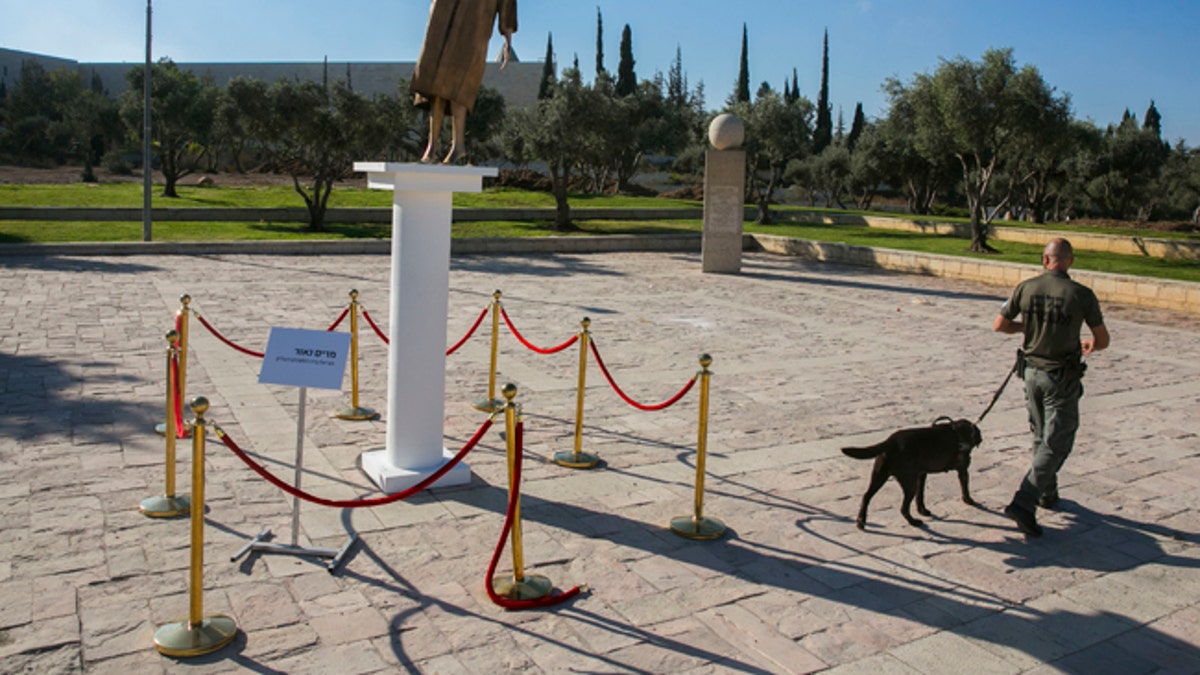
A security guard patrols near a golden statue of the Israel Supreme Court's president Miram Noar outside the court on Thursday, Aug. 31, 2017. (AP)
JERUSALEM – A religious nationalist group in Israel set up a golden statue of the president of the Supreme Court to protest its "dictatorship" over elected officials. Police removed the statue Thursday after it was raised outside the court overnight.
Derech Chaim, a group that wants to impose Jewish religious law in Israel, said it put up the statue of Miriam Naor to protest what one activist called the court's "dictatorship." Many Israeli hard-liners consider the court to be excessively liberal and interventionist, and senior Israeli lawmakers, including the justice minister, have questioned the court's power.
Police said they determined no criminal activity had occurred after questioning a number of people over the statue.
Ariel Gruner, a Derech Chaim activist, said the statue was erected in response to a court ruling this week over the country's treatment of African migrants. The ruling said that while Israel can transfer migrants to a third country, it cannot incarcerate them for more than 60 days to pressure them to leave.
UN EMBRACE OF ANTI-ISRAEL BDS MOVEMENT ENDANGERS THE PEACE IT CLAIMS TO SUPPORT
The ruling is among a series of decisions that "eliminates the possibility of elected officials, of the government, to make decisions and rule," Gruner said.
He acknowledged that the statue had been inspired by a golden statue of Prime Minister Benjamin Netanyahu erected by a left-wing artist in a main Tel Aviv square last year.
The migrant ruling also prompted Netanyahu to visit a hardscrabble area of Tel Aviv on Thursday where many African migrants reside. There he promised to find a way to deal with the migrants.
"We are dealing with illegal infiltrators — not refugees — illegal infiltrators, and the right of the state of Israel is to guard its borders and to expel the illegal infiltrators from within," he said.
Members of Netanyahu's religious and nationalist government regularly criticize the Supreme Court. After this week's decision on the migrants, Justice Minister Ayelet Shaked chided the judicial system for prioritizing individual rights over Israel's Jewish character. Other ministers vowed to draft legislation to bypass the ruling.
Earlier this year Shaked pushed for the appointment of more conservative judges to the nine-member bench.
Israel has grappled in recent years with how to deal with an influx of tens of thousands of migrants from Africa, mostly from Sudan and Eritrea, who have flowed in through the border with Egypt.
The migrants say they are fleeing persecution and violence in their home countries, but Israel sees most of them as economic migrants whose numbers threaten the country's Jewish character and are a burden on the low-income Tel Aviv neighborhood where many of them live.
Israel has built a fence along its southern border with Egypt that has all but halted the flow of migrants and has enacted laws enabling it to hold migrants already in Israel in detention centers or send them to third countries. The recent Supreme Court decision was in response to an appeal by rights groups against the latest iteration of the law.
